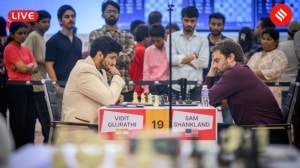Taj corridor: SC to take up plea against decision
A three-judge Bench of the Supreme Court, headed by Justice S H Kapadia, will take an application challenging “legal validity” of Uttar Pradesh Governor’s refusal to give prosecution sanction against Chief Minister Mayawati and former minister Naseemuddin Siddique...

A three-judge Bench of the Supreme Court, headed by Justice S H Kapadia, will take an application challenging “legal validity” of Uttar Pradesh Governor’s refusal to give prosecution sanction against Chief Minister Mayawati and former minister Naseemuddin Siddique in the Taj corridor case sometime next week.
The Bench has been monitoring the case for several years. The application has been filed by amicus curiae in the case.
Highlighting several “questions of vital public importance”, which arose from Governor T V Rajeswar’s denial to the CBI to prosecute the Chief Minister and her colleague, the application seeks directions to declare the constitutional validity of Section 197 CrPC, under which the sanction was refused. The section requires sanction required for any court to take cognisance of an offence allegedly committed by a public servant, not removable from office except with the sanction of the Government, in discharge of his or her official duty.
Aggrieved by the Governor’s decision of June 3, 2007, amicus Krishan Mahajan has urged the apex court to “issue appropriate direction to the CBI for calling records of the materials it placed before the Governor for seeking such sanction”.
The sanction was sought in relation to an FIR registered against the chief minister in Taj corridor case, which the applicant has pointed out as “an assault on Taj”. Pursuant to an earlier direction of the apex court of September 18, 2003, the investigating agency had registered the FIR and carried out the investigation. While asking for deciding the legality of the Governor’s order, the applicant has also asked the court to decide whether special designated courts concerned are bound by the sanction order of the competent executive authorities under Section 197 CrPC.
Mahajan has also raised a significant question—whether the CBI can seek a judicial review of a sanction order of the competent authority, when such orders negate its entire investigations?



- 01
- 02
- 03
- 04
- 05




























